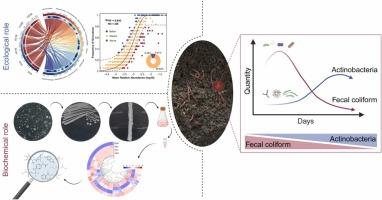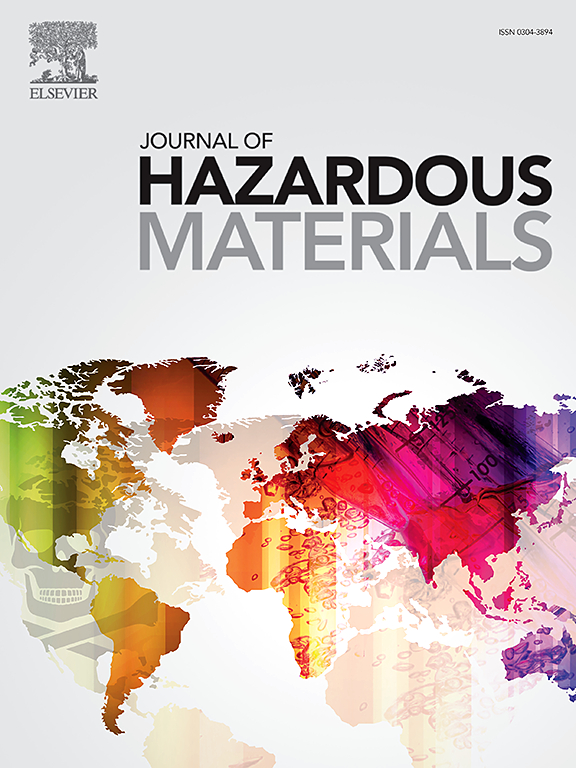放线菌对污泥蚯蚓堆肥中粪便大肠菌群的拮抗作用:基于生态学和生化角度的研究
IF 11.3
1区 环境科学与生态学
Q1 ENGINEERING, ENVIRONMENTAL
引用次数: 0
摘要
放线菌在污泥蚯蚓堆肥过程中起着至关重要的作用,但放线菌在污泥蚯蚓堆肥过程中的演替动态及其对致病菌的拮抗机制尚不清楚。本研究通过比较接种蚯蚓和未接种蚯蚓的污泥处理,从生态学和生物化学角度探讨了放线菌群落的变化及其对粪大肠菌群(FC)的拮抗作用。结果表明,蚯蚓的加入使污泥的降解途径发生了显著变化。与对照相比,蚯蚓堆肥15 d后放线菌的相对丰度和α多样性显著高于对照(P <;0.05)。与对照产品相比,蚯蚓堆肥中FC的数量减少了70.72% (P <;0.001)。中性群落模型和微生物网络分析表明,放线菌与蚯蚓联合在后期表现出比对照更大的功能和稳定性,为抑制FC创造了有利条件。此外,从蚯蚓堆肥中分离到的3株链霉菌对FC具有明显的拮抗作用,其抑菌机制具有多层次的机制。本研究表明,蚯蚓在污泥蚯蚓堆肥过程中调节放线菌群落动态,从而增强放线菌中有效抑制FC的拮抗化合物的分泌。本文章由计算机程序翻译,如有差异,请以英文原文为准。

Antagonistic effects of Actinobacteria on fecal coliforms in sludge vermicomposting: Studies based on ecological and biochemical perspectives
Although actinobacteria play a crucial role in sludge vermicomposting, their succession dynamics and antagonistic mechanisms against pathogenic bacteria during vermicomposting process remain unclear. This study investigated the changes of actinobacterial communities and their antagonistic effects on fecal coliforms (FC) from ecological and biochemical perspectives by comparing sludge treatments with and without earthworm inoculation. Results showed that the addition of earthworms could lead to a significantly different degradation pathway of sludge. Compared to the control, the relative abundance and alpha diversity of actinobacteria in vermicomposting were significantly higher than those in control after 15 days (P < 0.05). Moreover, the number of FC in the vermicompost reduced by 70.72% against the control product (P < 0.001). The neutral community model and microbial network analysis revealed that actinobacteria combined with earthworms exhibited greater functionality and stability in the later stages than those in control, creating favorable conditions for the suppression of FC. In addition, three strains of the genus Streptomyces isolated from vermicompost exhibited significant antagonistic effects against FC, which exerted multi-level antibacterial mechanisms. This study suggests that the earthworms modulate actinobacterial community dynamics during sludge vermicomposting, thereby enhancing the secretion of antagonistic compounds from actinobacteria that effectively inhibit FC.
求助全文
通过发布文献求助,成功后即可免费获取论文全文。
去求助
来源期刊

Journal of Hazardous Materials
工程技术-工程:环境
CiteScore
25.40
自引率
5.90%
发文量
3059
审稿时长
58 days
期刊介绍:
The Journal of Hazardous Materials serves as a global platform for promoting cutting-edge research in the field of Environmental Science and Engineering. Our publication features a wide range of articles, including full-length research papers, review articles, and perspectives, with the aim of enhancing our understanding of the dangers and risks associated with various materials concerning public health and the environment. It is important to note that the term "environmental contaminants" refers specifically to substances that pose hazardous effects through contamination, while excluding those that do not have such impacts on the environment or human health. Moreover, we emphasize the distinction between wastes and hazardous materials in order to provide further clarity on the scope of the journal. We have a keen interest in exploring specific compounds and microbial agents that have adverse effects on the environment.
 求助内容:
求助内容: 应助结果提醒方式:
应助结果提醒方式:


